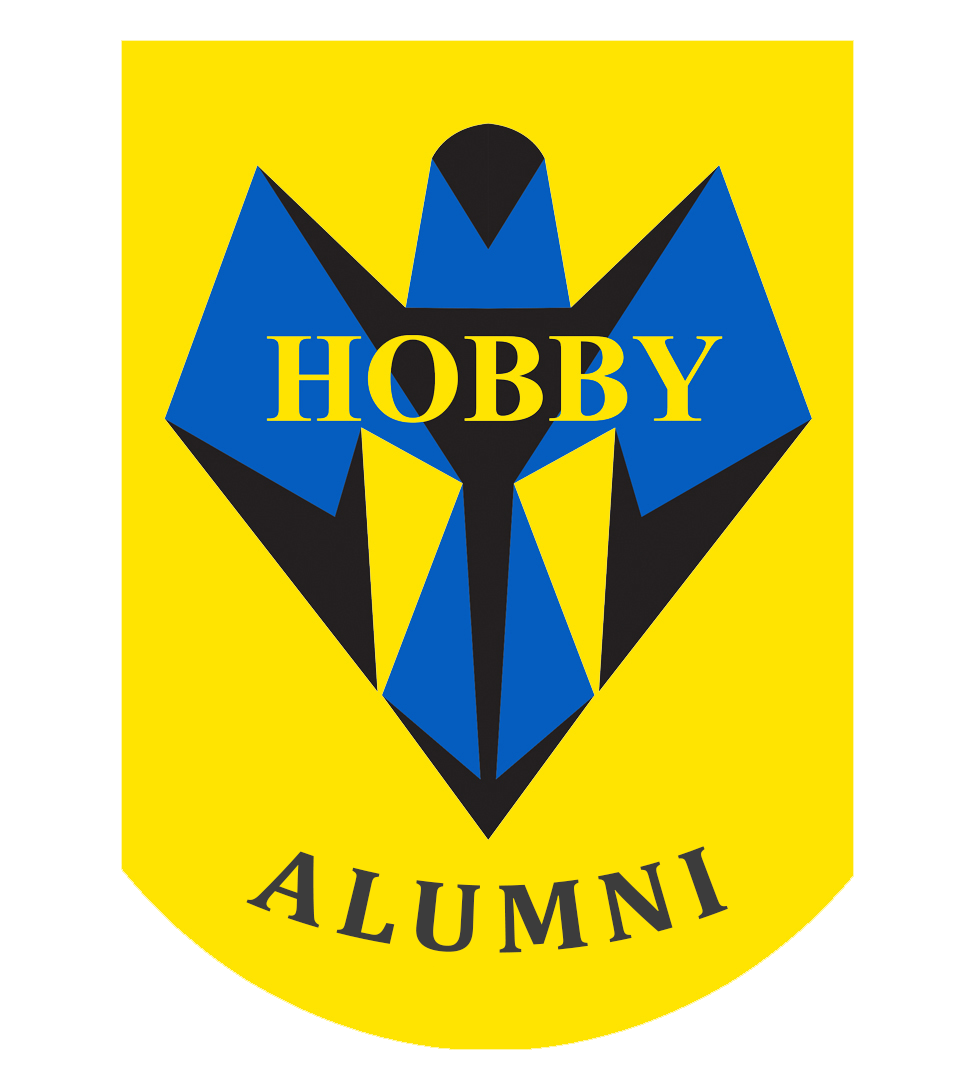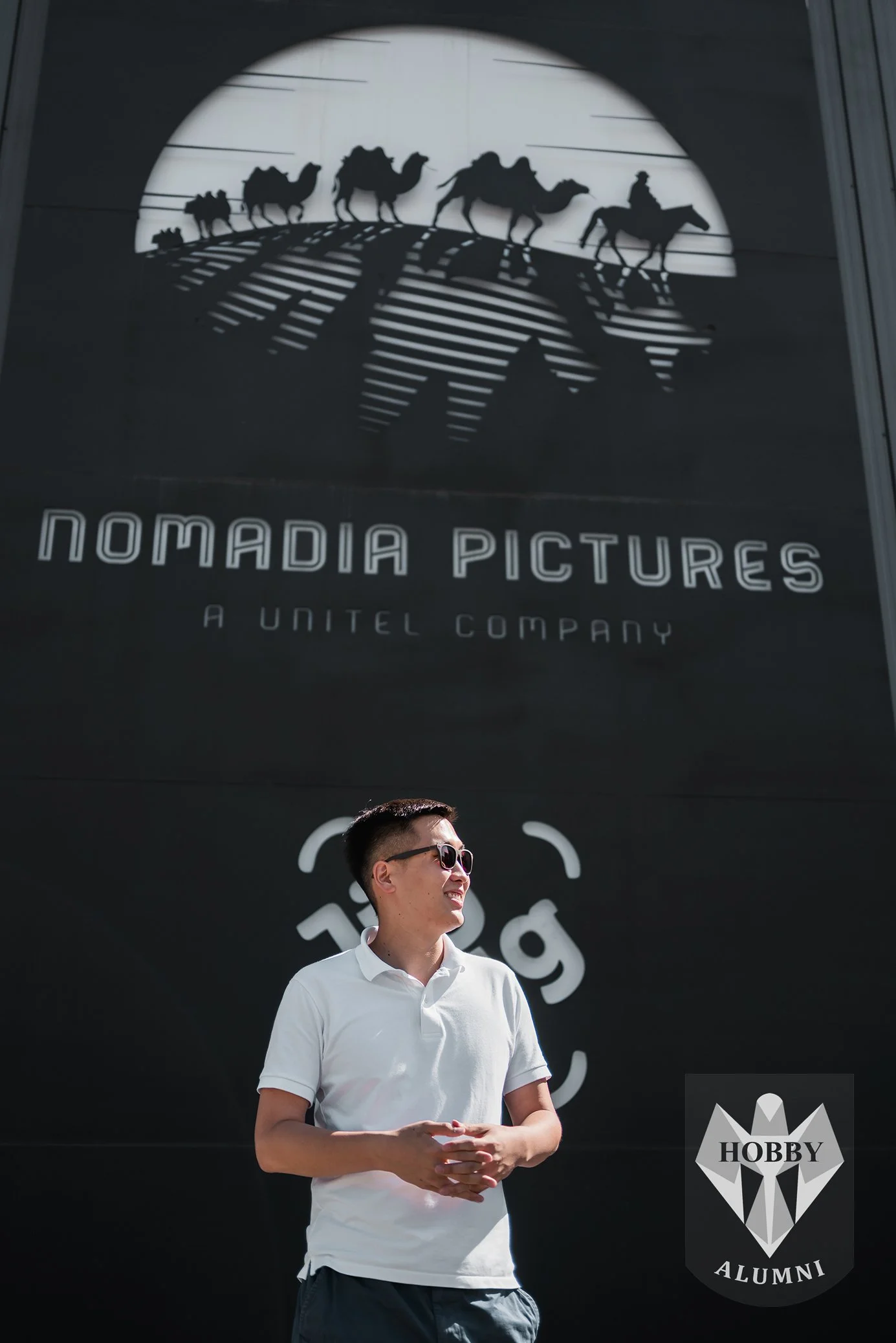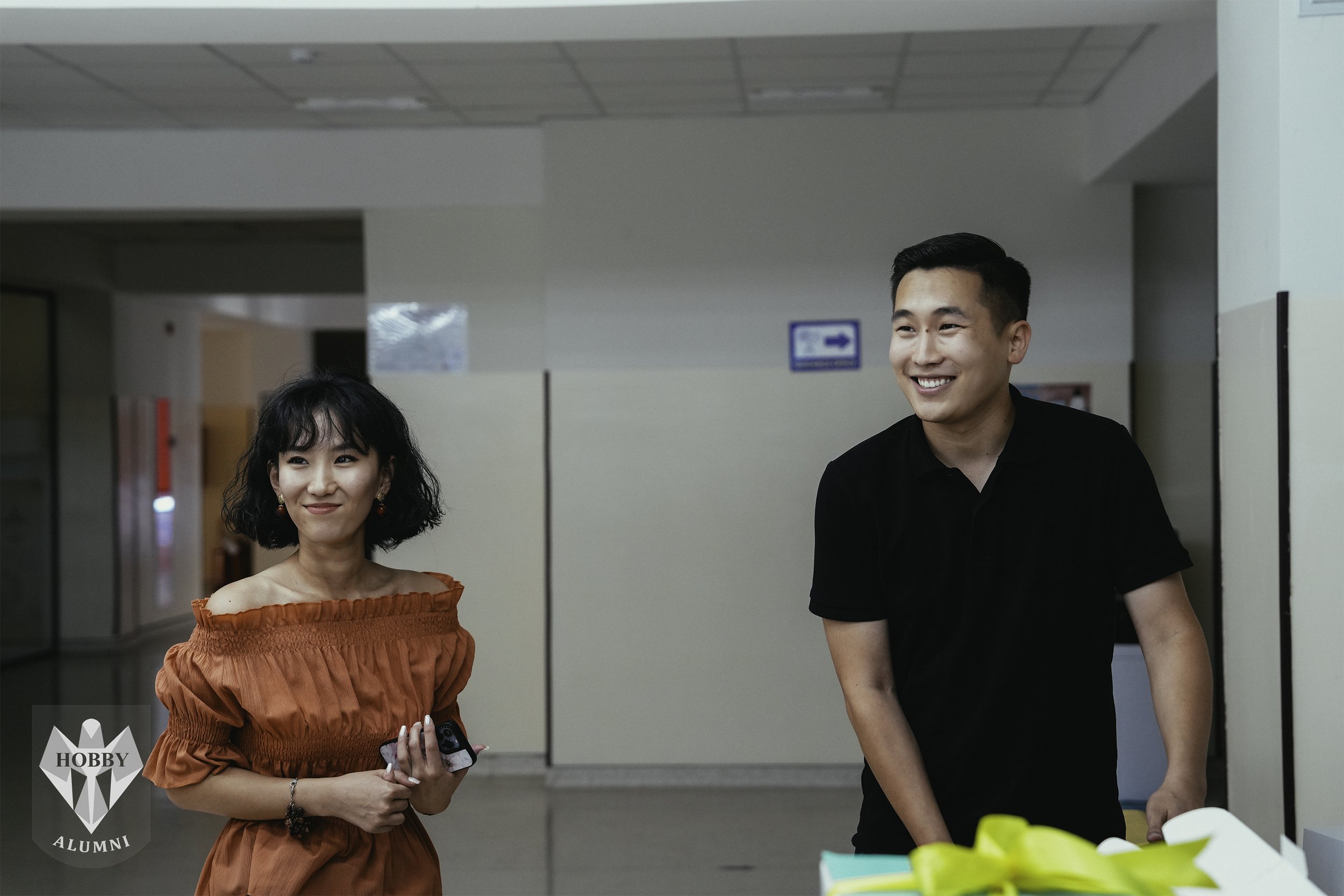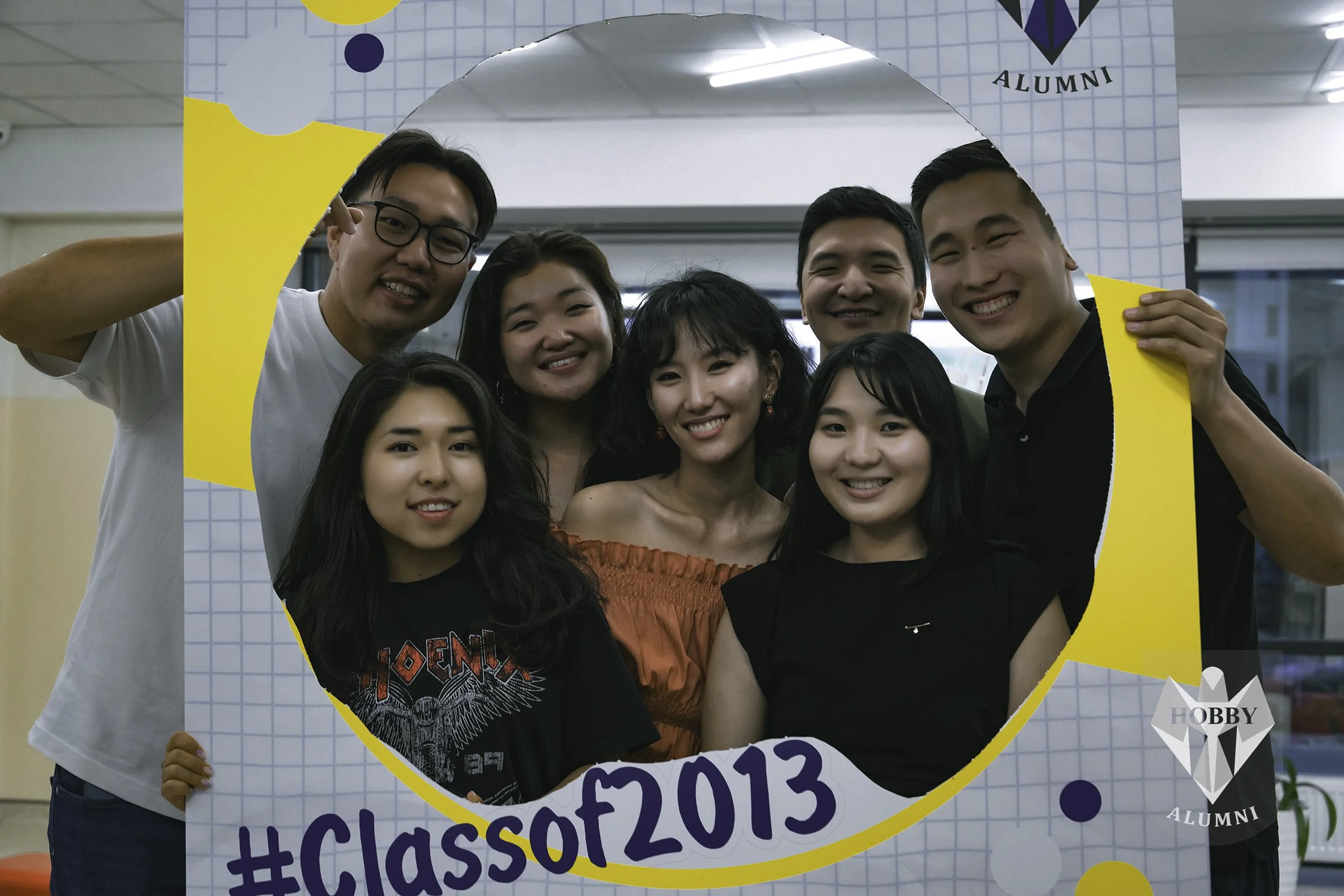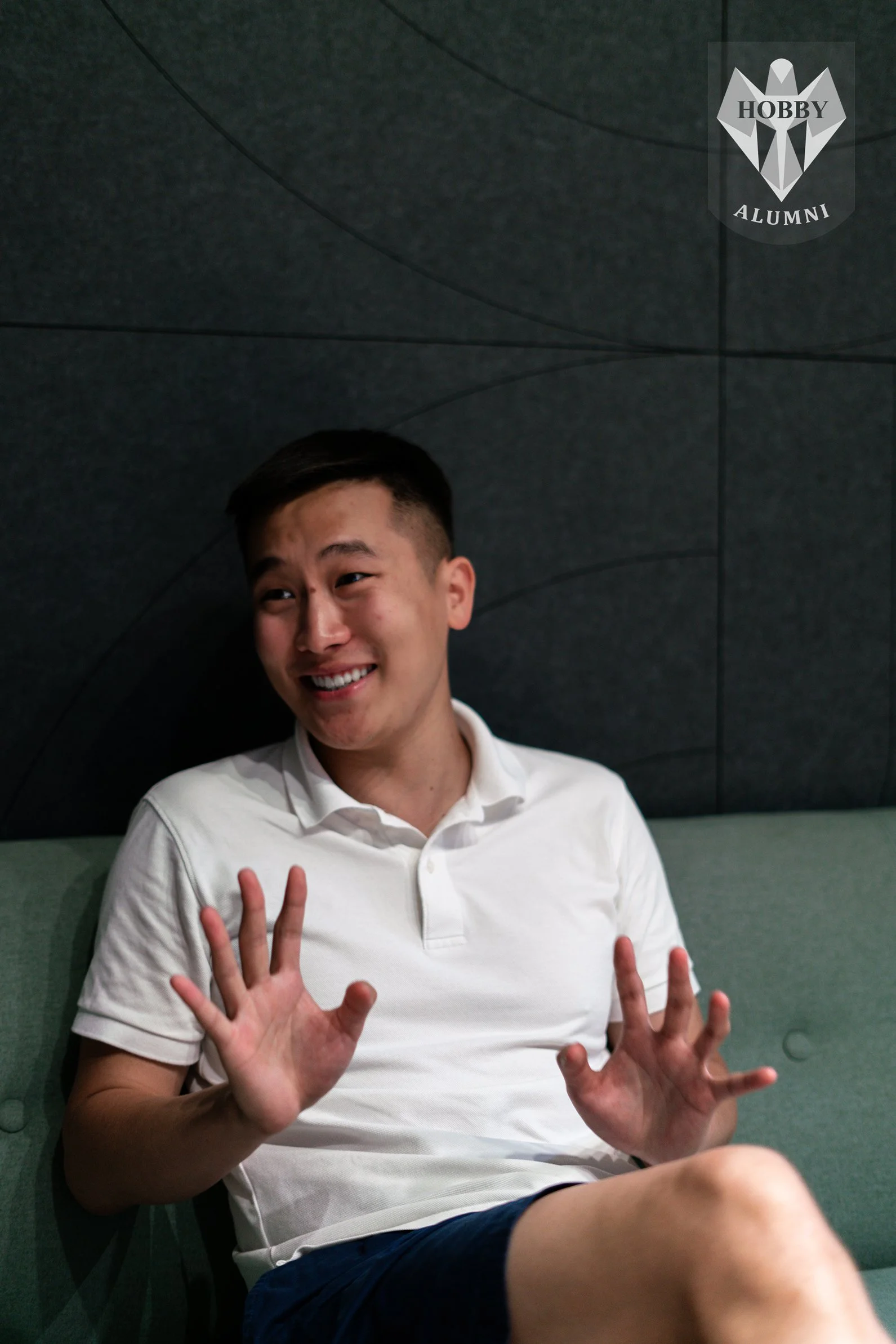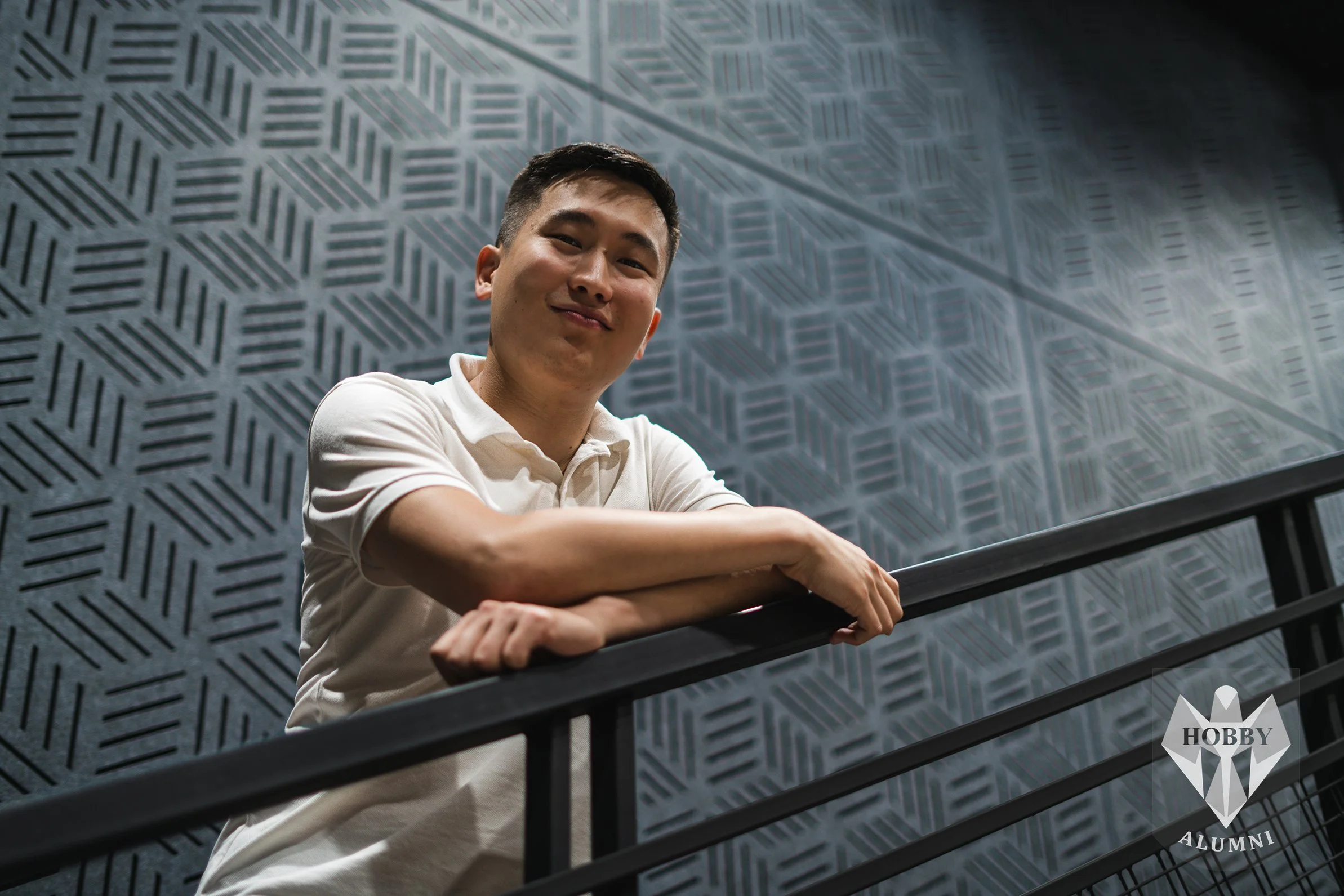MUNGUN Altangerel - From Movie Reviewer to Movie Producer
Interviewed by Nomko Baatar, photographed by Haidar Arshad.
Get to know Mungun Altangerel (Class of 2013), an executive movie producer at Nomadia Pictures who dropped out of Loyola University in New Orleans, US to pursue his passion in the media and entertainment industry in Mongolia. Starting out as a TV host at MNB and co-founding his own media agency while at the National University of Mongolia, he has remained dedicated to his love for cinema, watching as many as 200 films annually (that’s about 17 days spent without interruption!) For the past five years, Mungun has poured his passion into writing movie reviews, and his diligence and unique reviewing style have garnered him a reputation within the movie industry in Mongolia - he’s been invite to judge at the 2022 Golden Ger International Film Festival, host the 95th Oscars Awards streamed in Mongolia, and even hosted a segment in the 2023 Naadam Festival. Beyond that, Mungun is actively involved in community service, having been the former director of public relations at the Rotaract Club of Ulaanbaatar and a current Shaper in the Global Shapers Ulaanbaatar Hub, a network withinin the World Economic Forum community comprising inspiring young individuals under the age of 30 working together to address local, regional, and global challenges.
Full name: Mungun Altangerel
Hobby Alumni: Class of 2013
Higher Education:
Loyola University of New Orleans - Finance/Accounting National
University of Mongolia (МУИС) - Public relations and journalism
Languages: Mongolian, English, Russian
Sector(s): Media
Current Workplace: Nomadia Pictures LLC of Unitel Group
Past Workplaces:
Public Relations - Unitel Group
Content officer - Content Marketing
LLC Intern - UNESCO
Mongolia Journalist/TV Host - Mongolian National Broadcaster
Frequented Website: Youtube, Reddit, Wikipedia
3 Favorite Restaurants or Coffee shops in UB: No strong preference or dislike towards any food stuffs
3 Apps To Recommend:
Home Workout - No Equipment -> for keeping in shape without the stress of missing out on your gym days
Youtube studio -> basic analytics app for your Youtube channels
Nano Teleprompter -> or any other teleprompter app for making a better organized vlog style videos with your phone
3 Books To Recommend:
The Five Love Languages /1992/ - Drastically improved my outlook on relationship with my significant other, family and friends
World War Z /2006/ - Forget the terrible movie. Be immersed in an excellent zombie apocalypse story. But more importantly, this book's magic is demonstrating how many different perspectives peoples, professions and backgrounds have on any seemingly simple issue. Would particularly recommend the audiobook version which has an excellent cast.
Forever War /1974/ - A futuristic soldier fights an interstellar war with aliens. In addition to interesting sci-fi ideas, the theme of coming back to your home and neither you, nor your home being unrecognizable resonated deeply with me during my years back in Mongolia.
3 Movies or TV-Shows To Recommend:
Seven Samurai /1954/ - Feels somewhat pretentious to recommend a very old, non-english, black and white movie thats about 3,5 hours long. But the story is so captivating, the characters so charming, and the pacing such a masterclass that the whole movie feels like it finishes in 5 minutes.
City of Life and Death /2009/ - Despite the movie being set during the WW2, it unexpectedly made me see what human tragedies were the "glorious Mongol conquests" that I was quite proud to impress upon my international friends.
Ratatouille /2007/ - Its not just a story about a talented cooking rat. Rather, its a story about how you face much hostility, misfortune and judgment when you try to stay true to your calling and make you own lane in life.
3 Songs You Are Listening To Most Right Now:
Where is My Mind - Frank Sinatra (AI cover)
NLO - Лапа
Choidog ft. Tomm - Тааралдах байх
the present
Can we start off with what you do, please?
I'm an original content producer at Nomadia Pictures, which is the movie production arm of Univision Group. We produce content for Univision LookTV, the Mongolian equivalent of platforms like Netflix, Disney, and so on.
That sounds interesting. What kind of work does that incorporate?
As an Executive Producer, I report directly to the studio executives. It sounds quite fancy on paper but what I’m basically doing day-to-day is meeting with movie directors and producers who approach me and assessing their projects. Before presenting these projects to my boss, I conduct financial evaluations to estimate potential revenue and determine whether a partnership with a particular project would be beneficial for us. So this position is much less about the artistic side and more about working on Excel sheets (laughs).
Can you share any surprises or insights you've gained as you are becoming more involved in the movie industry? Anything that you weren't aware of when you first started?
There haven't been too many surprises in terms of the movie industry itself, except perhaps some quirks related to metrics and how we calculate success. What constitutes a good effort can vary greatly from person to person. Filmmakers don't set out to make terrible movies - they're trying to create something meaningful. And from an artist's perspective, being in a movie is a matter of personal growth and artistic expression. However, on the corporate side, the studio doesn't want to invest in movies that would incur significant losses. From a consumer's perspective, I'd say vote with your wallet. Don't spend your money on bad movies, as the film industry often operates based on audience feedback.
“What constitutes a good effort can vary greatly from person to person. Filmmakers don't set out to make terrible movies - they're trying to create something meaningful. And from an artist's perspective, being in a movie is a matter of personal growth and artistic expression.”
Can you give us an overview of the movie production process and your personal involvement in these different phases?
It all starts with pre-production. Pre-production is having an idea for a movie project, maybe a series or a feature film. And on the corporate side, sometimes we receive directors or screenwriters who approach us with their projects. Or sometimes we work off of our data and assess the need for a certain kind of genre within a certain time frame. After that, a team is assembled and a screenplay is written. The final production depends on the timeline - maybe we need it next month or maybe we need it next year or the year after. It's a long process that involves a lot of people and a lot of money. So, this can take from weeks to months to years.
Currently, I'm more involved in the later stages of the production process, especially when it comes to securing the necessary funds and contracts. That's where my role as a producer has been the most prominent so far. However, I'm eager to get more involved in the earlier phases of development and production. These early stages are where the creative ideas take shape, and I'm looking forward to participating more actively in bringing those ideas to life.
interim - the education
What from your previous job experiences prepared you for this position? A lot of people know you as a movie reviewer, but as you said, it’s also a lot about other skills such as dealing with the financial aspects, stakeholder management, and so on. How did you acquire those skills?
When I was in high school, I used to think that I would become an investment banker or an accountant, attracted by the idea of a well-paying, “serious” office job. After graduating from Hobby, I went to Loyola University, a Jesuit university in New Orleans, which is a very cultured place in the South. It has a blend of different cultures and time periods, from Native American heritage to French, Spanish, and Vietnamese influences. People there were not dogmatic about things, so my university experience exposed me to many cultures and people with different outlooks. For example, I was involved in clubs like the Muslim Club, the Christian Club, and I even served as the president of the International Student Association. Interacting with diverse individuals made me realize that I really love listening to and sharing people's different experiences and outlooks.
I also started a YouTube channel covering video games with a friend, well before the explosion of Mongolian vlogs. It was during this time that I discovered my passion for sharing my experiences with people through media. So, while I entered university with the intent to major in finance or accounting, during my freshman and sophomore years, I realized that there was much more to life, and that I had no real interest in finance or accounting at all, either academically or professionally (laughs). If I had continued down that road, I would probably have ended up as an accountant somewhere, feeling quite miserable. I realized I didn't want to waste more time and money on something I wasn't passionate about. So, I decided to come back to Mongolia and pursue my interests in media.
How did your experiences in high school influence that, especially since you mentioned that you faced pressure in high school to follow a specific academic path? How did you manage to balance the expectations of being a model student with your genuine interests in media and content creation?
“The idea of pursuing a career in investment banking was something I had convinced myself of, but the lies you tell yourself can only take you so far. ”
It's true that I've always been interested in documenting things and creating content - even in high school, I enjoyed taking photos and making videos. I was inspired by the media I consumed, and that pushed me to create content that I would want to watch and share with others.
What else did you enjoy doing at Hobby? Can you tell us more about your educational journey, including your time before joining Hobby School?
My educational journey is quite diverse. I started in the countryside where I finished my alphabets, then attended Plekhanov school and another very small Russian school until fifth grade - my Russian is good enough to watch a movie (laughs). After that, I attended public school Number 33 and the Mongolian Turkish High school, so Hobby School was actually the sixth school I attended.
I think the reason I switched schools so much was because my parents always sought better educational opportunities for me, prioritizing my education and always looking for better schools, even if it meant moving. While I had started out in international schools, they later realized I needed to experience the real world. So, they enrolled me in a public school, which was an important point in my development as well since I went from this small school with 5 other classmates to having 49 other classmates. This really put things into perspective, even though I was only a 6th grader. Eventually, I ended up at Hobby School, which was considered one of the better schools at the time.
How did Hobby School differ from your previous schools, and what were your main takeaways from your time there?
Hobby School had a different culture compared to my previous schools, especially the boarding school I was previously at. Kids at Hobby were more focused on going abroad, not just living day to day. But at the same time, everyone was friendly, no one was aggressive or trying to beat each other up, and there wasn't an intense rivalry or competitiveness between the classes. It was a refreshing change, but overall I think I was very fortunate to experience different types of schools, from the countryside to the city, from Russian schools to Mongolian public schools, and from a Turkish boarding school to an American style English school.
Can you share some of your favorite moments or memories from your time at Hobby School?
One of my favorite aspects of Hobby School was how friendly everyone was. The students were incredibly welcoming and accepting, which I still can't get over, and I hope my children can have school experiences like that.
“ I didn’t think about it too much at the time, but looking back, I realize that when you move around a lot and experience different places, you begin to appreciate things more because they may not last. You want to enjoy moments as they happen and preserve them for later. ”
How did it feel like to be back in Mongolia after Loyola University and going to school here?
The year I came back to Mongolia, I decided to take a gap year to figure out what I wanted to do. Since I had a stressful few years prior, starting with high school, I was quite lost in what I wanted to do. I only ended up studying journalism and public relations at the National University of Mongolia because I knew that getting my bacherlor’s degree was something I needed to do. While I may not have thoroughly enjoyed my university experience in Mongolia, I had to power through it and find things that I appreciated. And more importantly, when I came back to Mongolia, I wanted to give back to my community because I realized that not everyone had the privilege to study abroad or learn English. My perspective shifted towards contributing to my community - if one person benefits, it ultimately benefits society as a whole. So, I became actively involved in community service, joining communities such as the Rotaract Club, the Global Shapers Ulaanbaatar Hub, and the Hobby School Alumni Association.
“My perspective shifted towards contributing to my community - if one person benefits, it ultimately benefits society as a whole.”
the past
You mentioned that you took a gap year before starting at NUM. What did you do during that period?
“Seeing my friends graduate and begin their careers while I was still in university was challenging. Even though I understood that everyone was going down their own lane, it was still a mental hurdle for me. ”
This motivated me to explore various opportunities while still in school. I didn't want to rely on my parents financially, so I actively sought out part-time jobs and internships in media, journalism, and marketing agencies. These experiences allowed me to broaden my horizons and make valuable contacts.
That’s how I actually came across some posts from Mongolian National Broadcasting, announcing that they were looking for male journalists. Even though I hadn't completed my university degree at the time, I decided to show them what I had been doing on YouTube. The network's producer liked what she saw, and I was given the opportunity to participate in the morning live program on national television.
Can you tell us more about that experience and what your day-to-day responsibilities were like? Were you also involved in scriptwriting?
MNB is what you would call a state-owned organization, but on the other hand, as a media organization, it’s also supposed to be independent, so it was very contradictory. It’s also a very old organization so it’s pretty slow-paced. A lot of effort was put into a few projects - in comparison, a privately owned media company would’ve been churning out content after content. And although there were a lot of inspiring and brilliant people there, the organization as a whole left something to be desired for. Of course, maybe if I were to work there now, I'd have seen things differently, but as someone who had just come back from the US, it felt somewhat slow.
In terms of my day-to-day responsibilities, it was quite intense. The morning program was a daily two-hour show that began at 7:00 AM, so I had to arrive at work around 5:00 or 5:30 AM. As the host, I had to prepare the daily program, including finding guests, organizing their paperwork, passing security, and coordinating their participation. This involved working with a variety of teams, such as sound technicians, camera operators, and so on. It was a dynamic and collaborative environment, with a lot of coordination required to ensure the program ran smoothly. This experience definitely improved my improvisational skills, and also helped me overcome my insecurities about my voice and looks - I became a much more confident person after working at MNB (laughs).
You're still involved with MNB to some degree, right? How do you maintain connections with colleagues and collaborators from previous workplaces?
Well, certainly you cannot always connect with everyone, but there's always people who fit your chemistry and are on the same wavelength. Maintaining connections with colleagues and collaborators is essential, even after you've moved on from a particular workplace. It's not enough to make connections initially; you need to nurture them over time. I make an effort to stay in touch with people I've worked with, whether it's through social gatherings once or twice a year, occasional emails or messages, or simply checking up on how they're doing. Building and maintaining professional relationships requires ongoing effort and communication.
What's your favorite or the most memorable hosting experience?
Because MNB has a focus on rural areas, we interview a lot of people who are farmers, herders, folk song singers, and so on. Sitting down with these individuals, who had completely different backgrounds and interests from mine, provided an opportunity for rich conversations. While there were awkward silences at times, I learned to genuinely become interested in their subjects and perspectives. It allowed me to gain insights I wouldn't have acquired otherwise in the city or with friends.
Thank you for sharing. So then after your university, you started your job search. Can you share more about your decision-making process and how you ultimately chose your first job after graduation?
Certainly. While I was still in school, I started a media agency with some of my friends, and learned the hurdles of running my own studio such as producing the content I wanted to but also having to pay the rent and for the equipment. So after graduating, I faced a decision: either go abroad with my wife or stay in Mongolia. We did begin the process of preparing the paperwork to study abroad, but then the COVID-19 pandemic hit. At that point, universities were shifting to remote learning, and it made more sense to stay in Mongolia, so I decided to join the corporate world because I wanted to challenge myself further. By this time, I had been writing movie reviews and engaging with my audience, but I felt a bit too comfortable. I didn't want to become complacent. So, I joined the public relations department at Unitel and stayed there for 2.5 years.
interim - the movie reviews
So while working in the corporate world, your influence as a movie reviewer is still growing. Can you tell us more about how this continued and ultimately led to your current role?
You know, I was thinking that this could be the title of our interview - From Movie Critic to Movie Producer (laughs). I worked as a movie critic in Mongolia for five years before coming to this position, and it’s funny to say that there wasn't any direct transition or specific experience in between. My reviews have always aimed to be as honest as possible, focusing on providing genuine insights rather than trying to sway opinions or sensationalize things.
“To me, writing reviews feels like discussing movies I’ve seen with friends. The core question has always been, “Is this movie worth your time and money?””
For me, the theft of time has always been the greatest crime there is - I hate lazy movies and lazy writing, so that’s where I’m coming from when I write my reviews. So as a movie fan myself and a reviewer, I always aim to answer that simple question, which translates well to my work because at the end of the day, the goal is to produce movies that people will pay to watch.
Furthermore, I was always careful to maintain my integrity by not accepting payment for positive reviews; I always stuck to my genuine opinions. So I think my integrity helped me establish my reputation as someone who is honest. Another thing that helped was my consistency - I’m very passionate about movies, so I watch around 200 movies per year and make content about them. My passion for movies is unwavering, and I enjoyed engaging with my audience and fellow movie enthusiasts. And people just respond to that kind of consistency and passion, especially in Mongolia, where the community is very small, so one man can cast a large shadow.
Through this community, I found out about the opening for the executive producer position at Nomadia Pictures. By the time I talked to them, they had already interviewed much more experienced and established people, but I think due to my consistency and record of integrity over the years, they were comfortable bringing me along.
Did you have a dream job or career when you were a child? Is this what you thought you would end up doing
My dream was to become one of those guys on TV or YouTube, who wear a suit in an office with a view - I think I was more attracted to the lifestyle rather than a specific job. However, as I got older and began choosing my major and career path, I became more conscious of the day-to-day responsibilities of those roles. It's quite amusing because even though I initially ran away from the idea of working in investment banking, my current role as an Executive Producer is somewhat similar because I analyze movies as projects, considering investments, timeframes, deadlines, returns on investment, profit margins, and so on. So, in a way, my career still involves aspects that I once thought I disliked (laughs).
Have you ever written a review that you have changed your opinion about?
Yes, absolutely. As you grow and evolve as a person, your tastes and perspectives change too. If you’re not changing as a person, then I think that’s very problematic (laughs). It's natural for your opinions to shift over time. In terms of Mongolian movies, there might have been some films I was quite harsh on, especially in the early days of my reviewing career. However, as I learned more about the context in which these movies were made and the challenges faced by Mongolian artists, my perspective evolved. Especially now that I'm working on the corporate side, I’m more aware of what kind of resources and opportunities they have access to. I came to understand that making a film in Mongolia involves a unique set of circumstances and constraints. Some artists work diligently to improve their craft and make it more accessible to the public. On the other hand, there are those who might become complacent or lazy - as the saying goes, “An old dog doesn’t learn a new trick.”
the future
How do you see your role evolving?
I want to bring more awareness to how Mongolian movies are made and the constraints and opportunities that exist. It's crucial for people to understand the context in which these films are produced. Sometimes, simple things like building sets for historical or science fiction movies can be quite challenging due to limited resources and restrictions.
“But bringing change to the film industry is like steering a massive ship; you can’t just rip through the iceberg. It’s about gradually influencing the direction by small degrees. I hope to contribute to this shift by raising awareness, encouraging support for the industry, and advocating for well-made Mongolian films.”
Are you still enjoying watching movies, or have you felt any added pressure now that it's become part of your livelihood?
While it's true that movies have become a significant part of my life and work, I still thoroughly enjoy watching them. However, I did reach a point where I feel like I need a break from writing movie reviews after doing it for five years. The film industry didn't change much during that time - the same mistakes are being made and the same people are working on the same ideas, so I want to explore other aspects of my passion for movies.
Taking a step back from writing reviews allowed me to continue enjoying movies without the added pressure of reviewing every film I watched. Now, as a corporate movie producer, I cannot give unbiased reviews since I’m more involved in the scene. So I'd like to take a break from Mongolian movie reviewing, and focus more on script writing.
Do you have any plans to pursue screenwriting more actively in the future?
Absolutely, I'm interested in screenwriting, and I have ideas for various scripts. However, I approach screenwriting with the mindset that it should be commercially viable and doable within the budget and time constraints. You can have a great screenplay, but if it’s not on the screen, then it doesn't really matter. Rather than locking myself into a single script, I prefer to have a list of ideas and work on them as opportunities arise. The core elements of the story remain constant, but the packaging can be adjusted to fit different needs. Flexibility is crucial in the ever-changing world of filmmaking.
Shifting our focus back to the film industry, you've mentioned that you believe it will change for the better. Can you elaborate on what you think needs to change and how it might evolve?
I'm optimistic about the future of the film industry, and I believe it's already changing for the better. One significant shift is the democratization of filmmaking. The internet has broken down barriers, allowing aspiring filmmakers to create and share their work more easily. You no longer need to attend prestigious film schools or rely on gatekeepers to have your voice heard.
What needs to change urgently is a broader mindset shift within the industry. Learning English is essential because it opens up a world of information, especially in an industry where international influences and collaborations are common. English proficiency should be considered a fundamental skill for filmmakers. Additionally, diversifying our exposure to different cultures and languages can enrich our storytelling.
“One significant shift is the democratization of filmmaking. The internet has broken down barriers, allowing aspiring filmmakers to create and share their work more easily. You no longer need to attend prestigious film schools or rely on gatekeepers to have your voice heard.”
Some might argue that learning English is a privilege. What would you say to those who might see it that way?
Learning English is not about privilege; it's about access to information and broader opportunities. English has become a global language, and proficiency in it can open doors for anyone, regardless of their background. While not everyone may have had the same access to English education, the resources to learn it are widely available today. It's an investment in one's personal and professional growth.
You've shared some valuable insights into your journey in the film industry. Do you have any advice for people who are trying to make it in the movie or TV broadcasting industry?
It's important to consider your goals and interests. For example, if your primary aim is to learn about how television production works, joining your local TV station can be a valuable experience. However, if you're more interested in creating content for the modern digital landscape, starting your own YouTube channel or social media presence might be a more effective path. The media landscape has evolved significantly, and there are diverse ways to gain experience and reach your audience. My advice would be to keep doing what you love and practice your craft consistently.
“Whether you want to be a writer, filmmaker, or any other creative professional, practice makes perfect. Don’t just keep your ideas in your head; put them into action. Learning and improving come through doing. Practice is the enemy of bad. ”
Lastly, could you share the most recent film you watched and your thoughts on it?
Certainly. The most recent film I watched was "Past Lives" directed by Celine Wong. It resonated with me because it explores themes of choices, regrets, and the paths we take in life. In a world filled with countless choices, many of us often wonder what could have been. The film delves into the story of a young woman who moves abroad and then seeks to reconnect with her homeland—a theme that resonates with the experiences of many in Mongolia.
